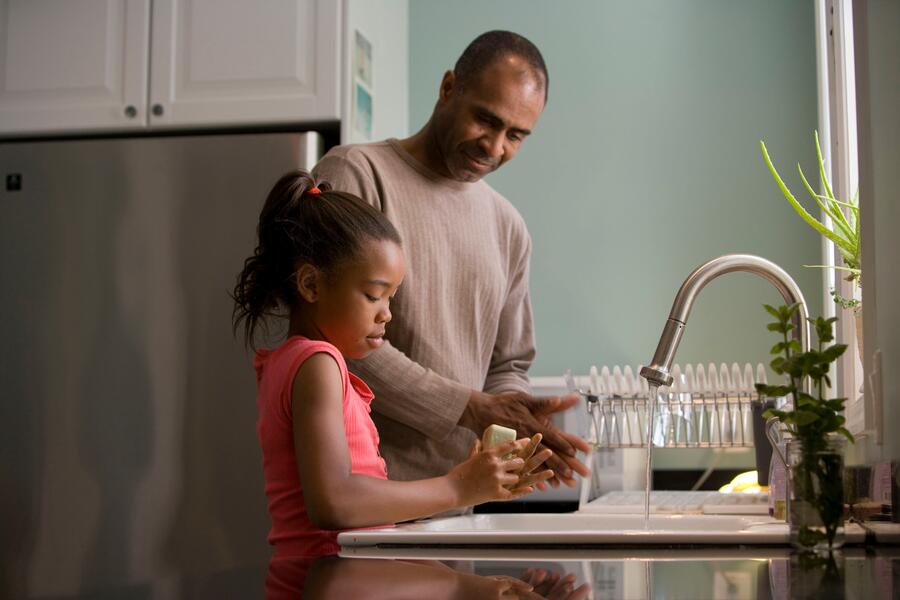Coronavirus can be difficult for parents to talk to their children about.
We naturally want to ‘protect’ children from unpleasant information and experiences. Even toddlers pick up on emotional changes in a family, and most children assume the worst. When discussing sensitive topics parents should always find a relaxed environment to be sensitive and open to their children’s questions and concerns. Figure out what your children already know, because you know they have already been informed from one source or another.
Make sure to ask open-ended questions:
What have you heard about the coronavirus?
What are your major concerns?
Do you have any questions I can help answer?
And how are they feeling about Coronavirus?
In the beginning, your child’s emotional reactions will outweigh their thoughts and concerns. Since this pandemic is not going anywhere fast having regular check in’s with them is important, because children do not always approach you with their fears. As my college, Stephanie Daniels discussed in her recent article on COVID and mental health, you also have to make sure you validate their feelings and concerns about the virus. They may not understand why Grandpa is in the hospital and why they cannot go and see him or if there is a possibility that their cat or dog is going to get sick. But a simple explanation about how cats and dogs cannot catch the virus or how us staying away from the hospital is actually helping Grandpa get better could put their minds at ease.
Keeping your children informed with new information and having them explain things back to you in their own language is a great way to know your kids are understanding you. Next, it is crucial to have your children model your behavior. Hand washing, sneezing into your sleeve, wiping your nose with a tissue and throwing it away, trying not to touch your face, not making physical contact with others, and wiping surfaces with at least 70% alcohol are all important in remaining virus free.

To take it to the next level, empower your children by doing tasks together. Singing ‘Twinkle Twinkle Little Star’ with the little ones twice while washing their hands, wiping down surfaces after meals together, and find other ways to give high fives to create a little connectivity without contact. When your children are practicing good hygiene praise them for it. This could be the answer to getting back to what we use to know as normal. Also, providing reassurance that we are all going to get through this and reminding them of a challenging time that they have gotten through before can put their minds at ease.
A few positive measures you can teach your children that will be beneficial during this time are:
- Demonstrating deep breathing to calm your nervous system and create relaxation
- Focus on the positive. Celebrating family and making it as fun as possible.
- Encourage children to choose something new to learn about.
- Establish and maintain a daily routine this provides a sense of control, structure and predictability that can be calming for children of any age.
- Identify projects that can make a difference and help others. Writing letters to neighbors or healthcare workers.
- Help kids keep in touch with friends and family by phone, email. FaceTime, Zoom, Skype
- Give kids space, everyone needs private time
- Be flexible and patient. Acknowledging that this is a difficult time for everyone.
- Monitor screen time: television viewing and social media. Replace with games or physical activities. TV and social media dispel rumors and provide inaccurate information
- Make plans or after the pandemic.
- Take time to talk, be honest, and accurate information about COVID-19
- Stay connected to school
- Know the symptoms of COVID-19: extreme fatigue, shortness of breathe, lack of taste or smell, dry cough (not allergies), fever, chills with or without shaking, muscle pain, headaches.
- Boost your immunity: eating a balanced diet, getting enough sleep. And exercising regularly.
Most families across the country are adapting to new changes in our daily lives that have been caused by this COVID pandemic. There is a responsibility felt by caregivers and parents to help everyone adjust to the new normal which entails children feeling safe, occupied and content in the world as we know it.
None of this is easy, and needless to say mentally and physically exhausting for everyone. As parents your new found role is to reassure and provide a sense of control within your households, so your children will remain content and have the understanding that the situation will get better.
We can all take the necessary precautions to make sure we are doing everything in our power to reduce the risk of illness. Teaching children positive measures, talking with them about fears, and educating them about the proper sanitation methods they can do to have some control themselves can alleviate their anxiety, uncertainty, and/or fear around infections. Most importantly, we need to remain calm and educated. Controlling your own anxiety by getting the most credible information you can. Focus on fact-based information and not on social media streams and constant breaking news. We all have different levels of quarantining but this does not mean you need to be isolated or alone. Speak with neighbors, family, and friends.
Remembering to also take care of yourself is extremely important because if you are not healthy then who is going to take care of your children. While everything else is going on in the world please be mindful to maintain your anxiety, get ample sleep, exercise, boost your immunity, and get acupuncture to keep everything in alignment!
About the Author
Lisa Salerno, L.Ac is a practitioner of Chinese medicine focused on providing her patients with thorough, individualized, and comprehensive care treating a variety of specific conditions and symptoms.
She provides acupuncture at Inspired Wellness Center to the Denver, Arvada, Westminster, Golden and Lakewood communities. In addition to treating diseases, Lisa promotes preventative health, wellness and patient empowerment utilizing a combination of techniques that may include acupuncture, bodywork, cupping, moxibustion, Chinese herbs, dietary and self-care recommendations. Her recommendations are based on her current knowledge and clinical experience.
